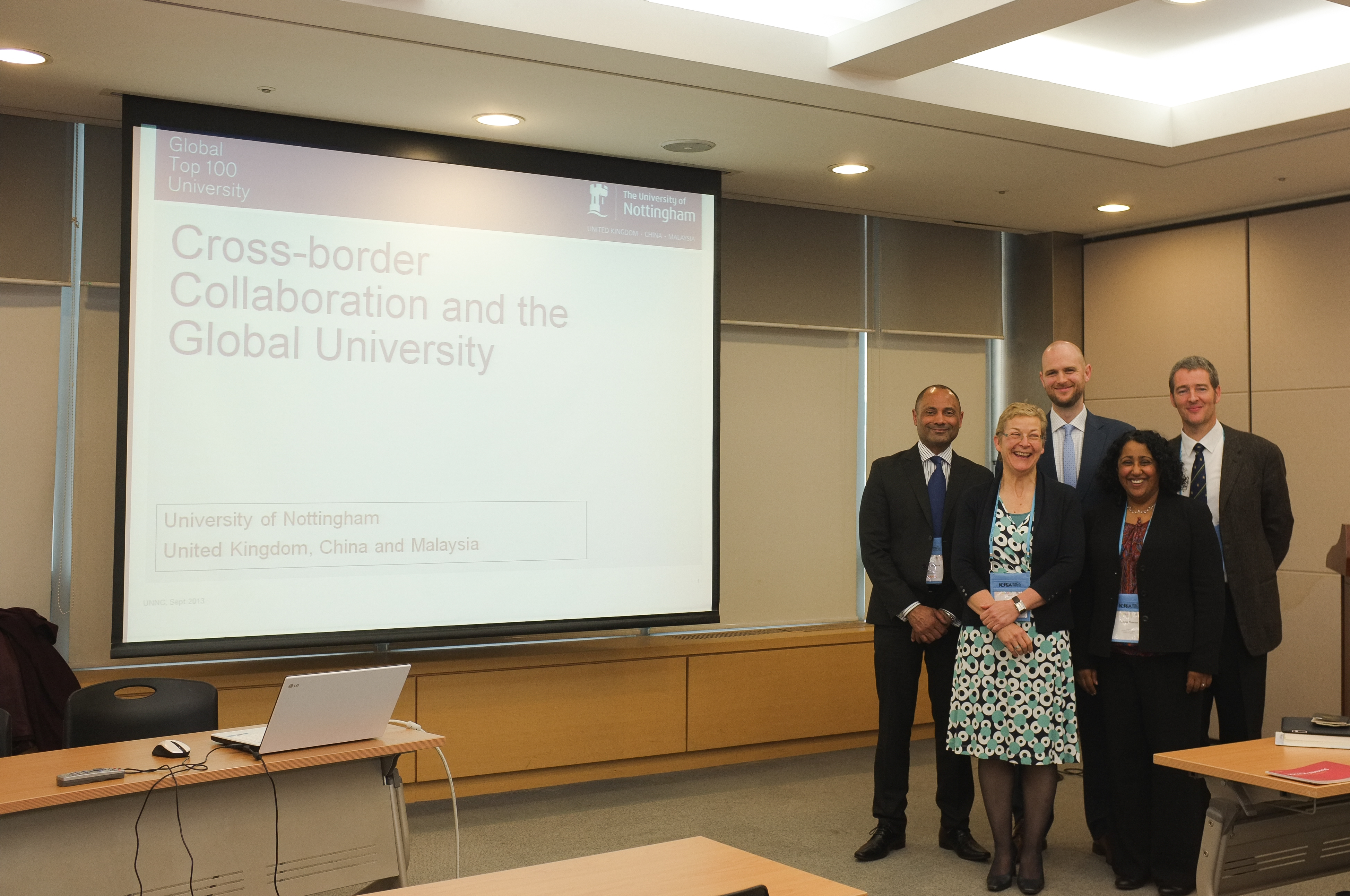
March 25, 2014, by Graham Kendall
Tricampus Team Presents to Asia-Pacific Association for International Education (APAIE) 2014 in Seoul
This post was contributed by Sean Matthews
Tricampus Team Presents to Asia-Pacific Association for International Education (APAIE) 2014 in Seoul, Korea.
There was another landmark for the University of Nottingham last week with a panel drawn from colleagues based at each of the three main campuses, who collaborated in a presentation at the annual conference, in Seoul, of the Asia-Pacific Association for International Education (APAIE). The organizers set aside a full session for the group, who spoke about ‘Cross-Border Collaboration and the Global University’. Nottingham’s team was made up of Derek Chambers, from the School of Nursing, Midwifery and Physiotherapy at the UK campus, who is also Chair of the Universitas 21 Health Sciences Millenium Development Goals group; Nalayini Thambar, the Director of the Careers and Employability Service across all three campuses; Tessa Payne, Head of Research and Graduate Services on the Ningbo Campus; Christopher Hill, Director of Research Development and Training at UNMC; and Sean Matthews, who is Head of the School of Modern Languages and Cultures (UNMC).
The Nottingham presentation was distinctive in several ways. It was, for a start, the only full panel at APAIE delivered by a single university – although in some ways we could legitimately claim, given the differing perspectives and positions, to represent three institutions (there’s a whole debate there). The presentation was also unique in bringing together expertise from academic, research training, management and professional services (we regret, now, not taking a student representative with us, because the conference, for the first time, created space for student voices and dialogue). One of the interesting topics of discussion across the conference, indeed, was the difficulty of connecting up knowledge and skills from the ‘silos’ of different parts of large university organisations, so it was significant that Nottingham’s panel was, in its small way, an indication of the ways that such divisions can and should be overcome.
The connecting themes of our presentations, in line with the conference theme, ‘Enhancing Cross-Border Education Cooperation with Universities in Asia-Pacific: From Past to Present and the Future’, related to the challenges and opportunities of both internal collaboration – within the Nottingham ‘family’ – and external work – within further networks such as U21 and beyond, including not only teaching and research collaboration but also the work of capacity building and development across the Asia-Pacific region. Sean led off with a brief narrative of Nottingham’s ‘global’ strategy, before moderating the session. Derek’s work with the U21 UNMDG group particularly caught the audience’s attention, as he showcased the remarkable work they have done across the world to support local health and environmental causes, and explained the ways in which the network of U21 institutions has managed to overcome the logistical and technological challenges in such work, to the benefit of students and communities. Nalayini’s account of Nottingham’s efforts to leverage its global presence in support for student careers and employability was also something attendees followed up, with discussion in particular about the increasingly sophisticated ways in which major employers and recruiters track ‘international’ experience in the graduate body – UNMC colleagues will soon be involved in further research assessing the ways in which our students can better articulate and present their ‘international’ credentials, and also the better to educate and understand employers’ and recruiters’ perspectives. Tessa and Chris reported on Nottingham’s network of Doctoral Training Centres, and the way this initiative is being rolled out to the international campuses, and also on collaborative work with Iraqi, Thai, Vietnamese and Indonesian colleagues in extending and enhancing postgraduate and research culture.
Post-panel there were a number of interesting conversations about potential further collaborations – in Asia-Pacific and beyond. APAIE is a major event in the region, with some 1300 delegates – including many from North America and Latin America. In subsequent posts we’ll report on some of the ‘hot topics’ that defined the conference agenda, and might be of interest to UNMC colleagues.
No comments yet, fill out a comment to be the first

Leave a Reply